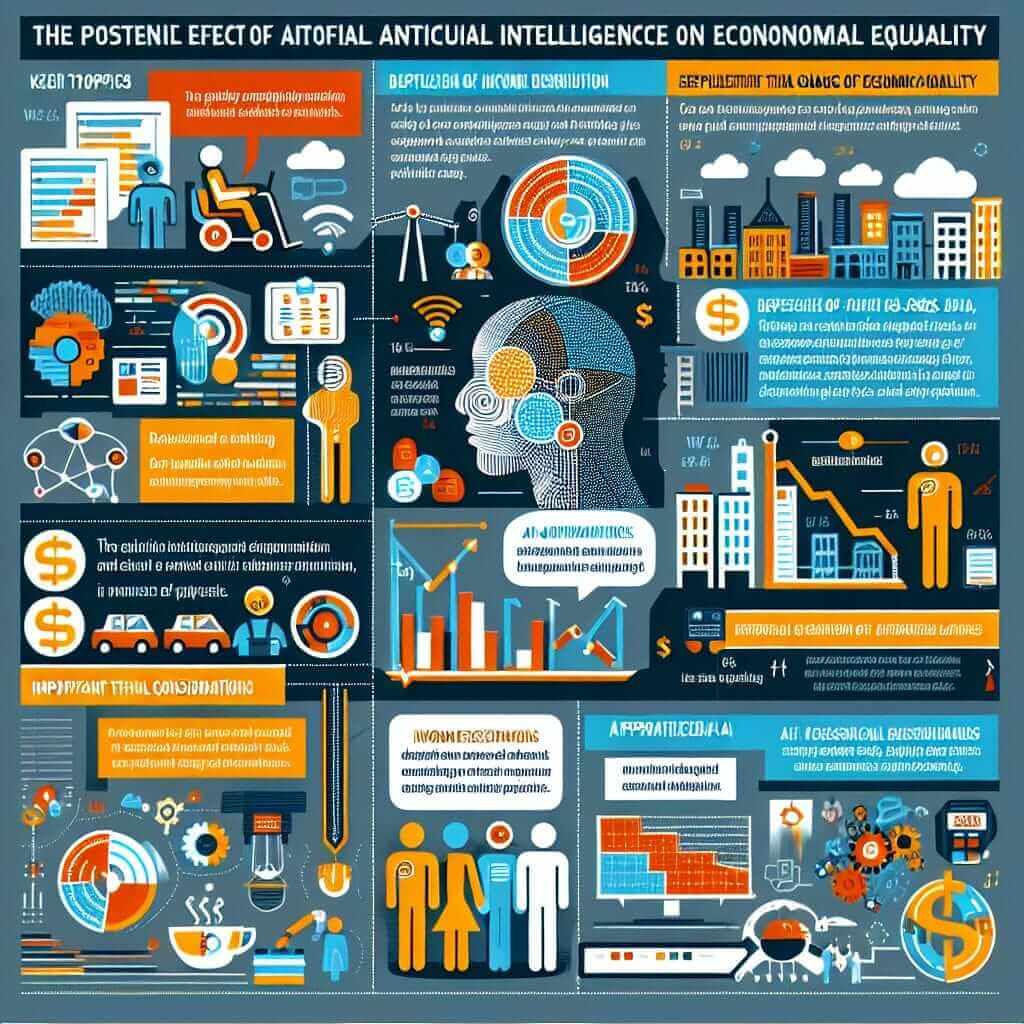The IELTS Reading test can be challenging, especially with complex and contemporary topics like “What are the implications of AI in economic inequality?”. This subject has garnered significant interest in recent years, making it a potential topic for IELTS Reading passages. Our objective is to provide an engaging, comprehensive reading passage aligned with the IELTS format for practice.
Artificial Intelligence (AI) is a rapidly evolving technology with far-reaching implications, including its impact on economic inequality. Historically, economic inequality has been influenced by numerous factors, but AI introduces new dynamics. Let’s delve into this subject and create a relevant Reading exercise based on actual IELTS exams.
Sample Reading Passage
Implications of AI in Economic Inequality
The advent of Artificial Intelligence (AI) has revolutionized various sectors, leading to profound economic transformations. While AI promises efficiency and innovation, it also raises critical concerns about economic inequality. This reading passage explores the multifaceted implications of AI on economic disparity and how it might reshape future economies.
Economic Disruption and Job Displacement
AI technology can automate tasks, making processes more efficient and less labor-intensive. However, this efficiency comes at a cost. As machines replace humans in various jobs, there is a palpable fear of widespread unemployment, especially in low-skilled sectors. The automation of routine tasks can lead to job displacement, disproportionately affecting workers with fewer skills and lower education levels. Economists argue that while some jobs are lost, AI also creates new opportunities, primarily in tech-intensive and high-skill areas. Nevertheless, the transition may exacerbate existing inequalities until the workforce adapts.
Income Inequality and Wealth Distribution
The profound impact of AI on income inequality is another pertinent issue. The economic benefits of AI advancements are often concentrated among a small segment of the population—typically those who own the technology or have the skills to leverage it. Consequently, there is a widening gap between high-income individuals and the rest of the population. The polarization of wealth distribution is evident as the wealthiest capitalize on AI’s potential while the less affluent struggle to keep pace.
Access to AI Technology
Another critical factor is the accessibility of AI technology. Developed nations and affluent individuals are more likely to benefit from AI due to better resources and infrastructure. In contrast, developing countries and economically disadvantaged communities face barriers in accessing these technologies. This digital divide can deepen economic inequality on a global scale, as those without access lag further behind in economic development.
Ethical Considerations
The ethical implications of AI in exacerbating economic inequality cannot be overlooked. Issues such as algorithmic bias and the accountability of AI decisions highlight the need for ethical guidelines and regulatory frameworks. There is growing concern that without proper oversight, AI could reinforce existing prejudices and systemic inequalities, further entrenching economic disparities.
Addressing the Challenges
To mitigate the adverse effects of AI on economic inequality, several measures can be implemented. Investing in education and training programs to upskill the workforce is crucial. Policies aimed at ensuring equitable access to AI technologies can help bridge the gap between different socio-economic groups. Additionally, implementing robust regulatory frameworks to govern AI use can prevent misuse and promote fair practices.
By understanding the implications of AI on economic inequality, policymakers, businesses, and individuals can work towards a more inclusive and equitable future.
 The Implications of AI in Economic Inequality
The Implications of AI in Economic Inequality
Questions
Multiple Choice
-
What is the primary concern regarding AI’s impact on jobs?
A. Increased labor costs
B. Job displacement in low-skilled sectors
C. Creation of routine tasks
D. Enhanced productivity -
Who benefits the most economically from AI advancements?
A. Low-skilled workers
B. The general population
C. High-income individuals
D. Developing countries
Identifying Information (True/False/Not Given)
- AI technology only affects low-skilled jobs. (True/False/Not Given)
- Developing countries have the same level of access to AI technology as developed countries. (True/False/Not Given)
Matching Information
-
Match the causes with their effects:
- AI automation
- Concentration of wealth
- Accessibility barriers
- Algorithmic bias
a. Digital divide
b. Job displacement
c. Economic benefits among a small population
d. Reinforcement of systemic inequalities
Sentence Completion
- One measure to mitigate AI’s adverse effects on economic inequality is ___.
Answer Key and Explanations
Multiple Choice Answers
- B. Job displacement in low-skilled sectors
- C. High-income individuals
Identifying Information
- False (AI affects both low-skilled and high-skilled jobs)
- False (Developing countries face barriers in accessing AI technology)
Matching Information
-
- AI automation – b. Job displacement
- Concentration of wealth – c. Economic benefits among a small population
- Accessibility barriers – a. Digital divide
- Algorithmic bias – d. Reinforcement of systemic inequalities
Sentence Completion
- One measure to mitigate AI’s adverse effects on economic inequality is investing in education and training programs.
Common Mistakes
- Overlooking Context: Students often miss the broader context, leading to incorrect answers in True/False/Not Given questions. Always read surrounding sentences.
- Misinterpreting Data: Misreading graphs or data within the passage is a common error. Take time to interpret visual information correctly.
Vocabulary
- Displacement (n): /dɪsˈpleɪsmənt/ – The removal of something from its usual place.
- Prejudice (n): /ˈprɛʤədɪs/ – Preconceived opinion not based on reason or actual experience.
- Affluent (adj): /ˈæflʊənt/ – Having a great deal of money; wealthy.
- Polarization (n): /ˌpoʊ.lə.rəˈzeɪ.ʃən/ – Division into two sharply contrasting groups or sets of opinions or beliefs.
Grammar Focus
Passive Voice
Structure: [Object] + [form of “to be”] + [past participle]
Example: “The economic benefits of AI advancements are often concentrated among a small segment of the population.”
Tips for High Reading Scores
- Practice Regularly: Consistency is key; practice reading passages daily.
- Skim and Scan: Master the skill of quickly finding information.
- Time Management: Allocate time for each passage to ensure you finish on time.
- Understand Questions: Carefully read questions before diving into the passage to know what you’re looking for.
By integrating these strategies and understanding the nuances of the topic, you can improve your reading skills and be well-prepared for the IELTS exam. Happy studying!


